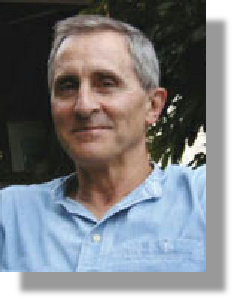


A Better Life. (The Bay Press, Ryton)
Publ in Thumbscrew, Autumn 1998
This first collection pamphlet, partly featured in Thumbscrew 6, targets with
new-
There is dry humour in 'Fünf', a snores-
(' ...under the chuppah/veiled and carefully guided,/ as if I were capable/ of bolting...') Nicely understated marital annihilation. Restrained detail and tight form match her confusions and leave us to sense the illusion of 'a better life.' But even here abstractions about the two men in her life intrude, adding nothing to how she dreams about being jostled by her father and scraping her skin only to wake and
feel my husbands's fingers
pushing up my night gown.
Discursiveness also blurs the focus of 'The Peacocks of Temple Sinai, Florida.'
Images of bagel-
saw later this was where it all began:
what followed was a wish to have again.
Licensed by a 'confessional' tradition that indulges centrifugal significances, the 'I' of the poems oscillates between dramatised and 'propria' persona. Hence the tendency to caricature relatives for their significances and to conjure up situations for moody disaffection. 'Werd Ich Donnern Hören Die See' (the sea's remorseless pounding) feels like someone writing about being stranded in a dockland, determined to be depressed:
'I have to wipe the clothesline/ to get rid of the residue from the docks,/ the shit
brown sea.'( A phrase tactically repeated) ' At night, the clock's red numbers/ accuse
me, remind me harshly/ how much time is left..' ( O for a moratorium on personified
clocks !) Silence in a noise-
The authorial presence can also be prosaic. In 'Touring Birkenau' rhetorical
shilly-
I think, she's learned nothing about Poland...
(...)I get angry and talk about memorials
while she says cramped lodgings are remembered longer than massacres
(...)....................I think, no,
she's learned much more than I have.
Shopping lists of examples and statistics are meant to convey exasperation in 'Turning Out' and 'My Mother and My Life as a Woman'. Manifestos about parental fantasies over dangerous liberation, and their interference in a life so utterly lurid or mundane perhaps we should infer irony at the expense of an overstated cause. Part of what's called 'the life my father feared' reads:
I dress in black, draw pentagrams on the floor
to find my lucky lottery numbers,
go to Rocky Horror with teenagers
and chase the unsuitable, always chase
anything normal away, attract the screwed up
who give only ulcers or VD....
In contrast the opening is judiciously sarcastic about the overprotected model housewife
and mother, one section in four pages where detail coalesces into a paradigm of domestic
horror and relinquishes quasi-
Garlitz's genuine satire is dispassionate and the tensions of the observer generate
its momentum. 'Security' suggests a contemporary, dehumanising obsession through
a superstore assistant's ambiguous fascination for an on-
...told by her mother to go buy milk
at the Safeway;
she laughs and laughs
and when her mother asks why
she answers: 'There is no safe way.'
Ivy Garlitz